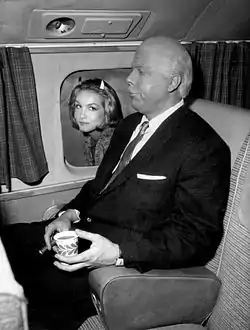Of Late I Think of Cliffordville
"Of Late I Think of Cliffordville" is episode 116 of the American television anthology series The Twilight Zone. It originally aired on April 11, 1963 on CBS. In this episode, an elderly, sadistic business tycoon buys the opportunity to enjoy amassing his fortune a second time.
| "Of Late I Think of Cliffordville" | |
|---|---|
| The Twilight Zone episode | |
 Julie Newmar as Miss Devlin and Albert Salmi as William Feathersmith | |
| Episode no. | Season 4 Episode 14 |
| Directed by | David Lowell Rich |
| Written by | Rod Serling |
| Based on | "Blind Alley" by Malcolm Jameson |
| Production code | 4867 |
| Original air date | April 11, 1963 |
| Guest appearance(s) | |
| |
Opening narration
Witness a murder. The killer is Mr. William Feathersmith, a robber baron whose body composition is made up of a refrigeration plant covered by thick skin. In a moment, Mr. Feathersmith will proceed on his daily course of conquest and calumny with yet another business dealing. But this one will be one of those bizarre transactions that take place in an odd marketplace known as the Twilight Zone.
Plot
William J. Feathersmith, the 75-year-old president of a large corporation, is a sadistic man who has made his fortune by financially preying on others. One night, a drunken Feathersmith confesses to the janitor Mr. Hecate, that, having reached the height of success, he is left feeling empty and purposeless, and dreams of returning to his small hometown of Cliffordville, Indiana, to start life anew. Hecate says that Cliffordville happens to be his hometown as well.
Attempting to go home for the night, Feathersmith is instead taken by the elevator to the 13th floor, where he finds a travel agency that was not there the day before. Feathersmith quickly realizes that the agency's head, Miss Devlin, is the Devil. She offers to fulfill his wish to return to 1910 Cliffordville, agreeing to his terms that he will look the same as he did then, but retain all memories of his first life, in exchange for almost all his liquidated worth, leaving him with $1,412. Because he knows which investments have succeeded and which have failed in the last 50 years, Feathersmith agrees.
Back in 1910 Cliffordville, he uses $1,403 to buy 1,403 acres of land which he knows to contain deposits of oil. He forgets, however, that the drill needed to access oil so far beneath the ground will not be invented until 1937. Feathersmith tries to woo the daughter of a bank owner but is startled that, rather than being the charming girl he remembers, she chatters incessantly and insists on entertaining guests with her shrill singing. Many of the stocks he invests in drop. He tries to "invent" devices such as a self-starter for automobiles, but does not know how to design them. The townspeople ridicule this, which causes Feathersmith to suffer palpitations. He realizes that following the strict letter of his terms, Miss Devlin has made him appear 30, but he is still biologically 75. Miss Devlin appears. Feathersmith accuses her of altering the past, but she says that all is as it was; he just chose to remember it differently. She needles him that he has lived off the work of others and is unable to create anything himself.
He pleads with Miss Devlin to send him back to 1963, even after she warns him that his actions in 1910 have changed things, and it can no longer be the 1963 he knew. Feeling some measure of sympathy for him, she agrees to fulfill his wish for just $40. Having no money left, Feathersmith hastily sells the deed to his land to Mr. Hecate for the $40, and leaves 1910 Cliffordville in disgrace.
In an altered 1963, Mr. Hecate is now the president of the corporation, having founded it with his oil profits earned after 1937. A cold and extremely self-centered man, Hecate mocks Feathersmith for having been a janitor for 44 years, while the now-powerless Feathersmith can only stand there and take the ridicule, just as Hecate did in his place.
Closing narration
Mr. William J. Feathersmith, tycoon, who tried the track one more time and found it muddier than he remembered, proving with at least a degree of conclusiveness that nice guys don't always finish last, and some people should quit when they're ahead. Tonight's tale of iron men and irony, delivered F.O.B. from the Twilight Zone.
Production
In the scene in which Feathersmith negotiates his way out of Cliffordville, there are several crates in the alley marked "This End Up", which were used as shipping crates for the wax figures in the previous episode, "The New Exhibit".